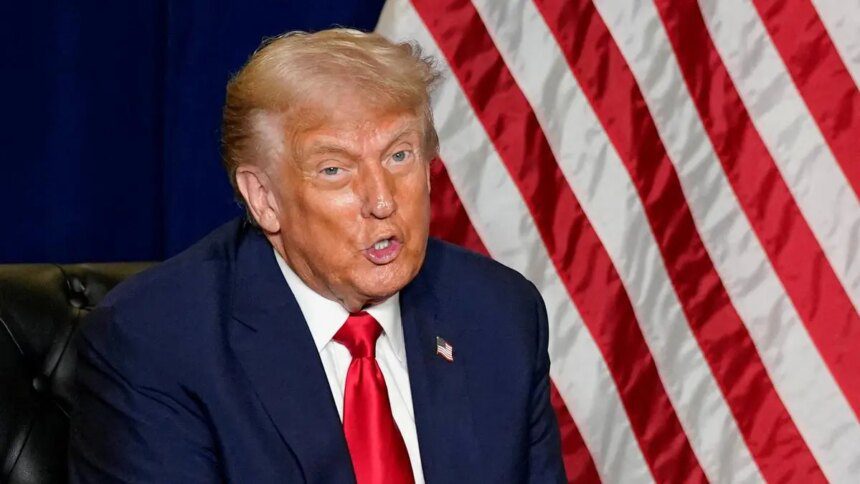Call it a case of unfortunate timing for Indian stock investors. President Donald Trump has delivered two significant blows to investor sentiment just as the market was beginning to show signs of recovery.
The MSCI India Index has declined for five consecutive sessions since Trump signed an order to revamp the H-1B visa program, a move that threatens to disrupt India’s $280 billion software services sector. His proposal to impose a 100% tariff on branded or patented pharmaceuticals led Indian pharmaceutical companies to join an Asia-wide selloff on Friday.
Prior to these developments, the MSCI India gauge had increased for three straight weeks, gaining over 4%, marking its longest positive run since May.
Trump’s recent actions have also unsettled foreign investors who were starting to adapt to the 50% US tariffs on Indian goods, which have strained diplomatic relations. Global funds shifted to sell Indian shares in recent days, after two weeks of positive investments.
“Escalating US–India tensions add another layer of pressure,” stated Jian Shi Cortesi, a fund manager at GAM Investment Management in Zurich. “The related headlines provide investors with an additional nudge to reallocate away from India toward markets displaying stronger momentum, such as China and South Korea.”
Faced with a slowdown in economic growth and slower corporate earnings expansion, Indian stocks have struggled to maintain momentum in 2025 after a six-year rally. The MSCI India index has risen approximately 2% this year, trailing a broader measure of Asian equities by more than 19 percentage points after previously outpacing it from 2021 to 2024.
Expectations Reset
Investors were optimistic about a potential year-end stock rally, supported by Prime Minister Narendra Modi’s recent cut to the nationwide consumption tax, effective September 22, along with the central bank’s commitment to growth and hopes that resumed trade negotiations with the US would yield favorable outcomes.
However, those expectations are being reassessed in light of Trump’s latest moves.
The MSCI India index recorded about a 3% decline this week, its largest drop since February. The IT sector experienced a 7.9% dip over five sessions, the steepest decline since April, as technology stocks account for nearly 10% of the MSCI gauge.
Historically, Indians have secured over 70% of H-1B visas. Economists have warned that changes to the visa program could hinder remittance inflows and weaken the local currency, which is already among Asia’s poorest performers. The rupee fell to a record low on Tuesday amid fears that India’s services exports would decline alongside merchandise exports suffering from tariffs.
An index tracking drugmakers also lost over 2% on Friday, marking its worst day since early August following Trump’s recent tariff announcements.
“The underperformance of Indian asset prices is likely to continue,” noted analysts Udith Sikand and Tom Miller of Gavekal Research. “The longer the 50% tariffs remain in place, the more probable it becomes that India’s economic growth will disappoint.”
In 2025, foreign funds have sold Indian stocks worth around $16 billion, making it poised to be the second-largest outflow on record, following a $17 billion withdrawal in 2022. The market’s performance in 2025 would have fared worse had it not been for substantial equity purchases by local institutions.
‘Quiet Corner’
Some market experts hold a more favorable view. Strategists at HSBC Holdings Plc, led by Herald van der Linde, upgraded their stance on Indian stocks to overweight from neutral this week.
“In stark contrast to the crowded trades in Korea and Taiwan, India is Asia’s quiet corner,” they stated. “While earnings growth expectations may soften further, valuations are no longer a concern, government policy is becoming a favorable factor for equities, and foreign funds remain cautiously positioned.”
The MSCI India index is currently trading at 21.8 times its 12-month forward earnings, down from 24.5 the previous year, according to data compiled by Bloomberg.
Investors largely agree that the near-term outlook for Indian equities, particularly regarding foreign flows, will be influenced by geopolitical dynamics. Allspring Global Investments is among those increasing exposure to domestically focused sectors like consumer goods and financials, which are less exposed to Trump’s America First policies.
Hedging costs for Indian equities also increased this week for the first time in a month. A measure of 30-day volatility on the National Stock Exchange of India Ltd. ended above its 50-day moving average on Friday, indicating that traders are preparing for increased market volatility.
Gary Dugan, CEO of the Global CIO Office, mentioned plans to shift portfolios toward China and potentially Latin America if geopolitical tensions with the US escalate.
Published on September 27, 2025.










